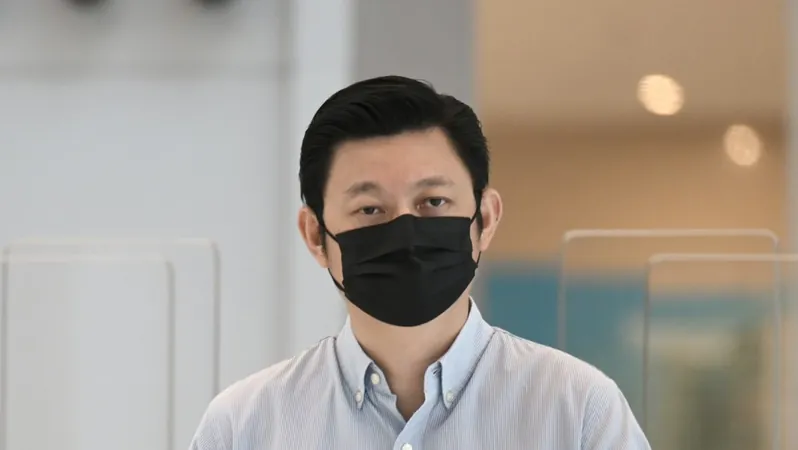
Unveiling the Genetic Secrets of Schizophrenia and Autism: The Groundbreaking Research of Susan Kuo
2025-01-15
Author: Li
Susan Kuo, a postdoctoral researcher at Mass General's Center for Genomic Medicine and Department of Psychiatry, has taken on the challenge of unraveling the complex role of genetics in neuropsychiatric conditions such as schizophrenia and autism. Her personal journey began in her childhood in Vancouver, Canada, where she witnessed the transformation of a beloved family member, whose once warm demeanor became shadowed by suspicion and retreat – challenges she later recognized as indicative of schizophrenia.
This pivotal experience ignited Kuo’s passion for psychology and medicine, leading her to pursue a Ph.D. in clinical psychology at the University of Pittsburgh, where she particularly focused on schizophrenia. Kuo’s mission is to clarify the often murky waters surrounding neuropsychiatric diagnoses, aiming to illuminate not just the genetic predispositions but also the profound variability in how these conditions manifest throughout an individual’s life.
Patterns of Development and Genetic Impact
Kuo’s research delves into the significant genetic factors associated with schizophrenia, particularly as the onset typically occurs between the ages of 18 and 25. This age range coincides with critical developmental transitions, prompting Kuo to examine whether there are distinct patterns of cognitive function and brain structure among individuals with a family history of the disorder.
Her groundbreaking study categorized the biological relatives of individuals diagnosed with schizophrenia into three age groups: pre-20s, 20s, and post-20s. The results revealed subtle cognitive differences in those in their 20s who possessed a greater number of schizophrenia-associated genetic variants than the general population. Such insights promise more targeted interventions as they suggest that genetic expression related to schizophrenia may fluctuate throughout a person’s developmental stages.
Early Intervention: A Key to Changing Trajectories
During her clinical internship at UCLA Medical Center, Kuo continued her exploration of schizophrenia. Notably, her work supported the theory that early life experiences, particularly in childhood and adolescence, can significantly predict the efficacy of interventions once the disorder manifests. Kuo observed that while many young adults may initially adapt to life’s demands, a deeper analysis reveals a range of experiences that impact their futures drastically.
Kuo's findings suggest there are three primary developmental paths leading to the onset of schizophrenia: maintaining social connections, experiencing gradual deterioration, and grappling with challenges from childhood. Encouragingly, those who faced early difficulties showed the most significant improvements with cognitive training therapies.
Looking to the Future: Genetic and Phenotypic Diversity in Autism
Now at Mass General, Kuo aims to extend her research to autism, collaborating with epidemiologist and geneticist Elise Robinson. The duo focuses on addressing the underrepresented genetic heterogeneity in autism, a factor crucial for improving clinical practices and family experiences. Kuo’s efforts include analyzing developmental milestones in over 17,000 autistic children versus more than 4,000 siblings without an autism diagnosis. Their findings revealed that, on average, autistic children achieve developmental milestones significantly later than their peers.
Moreover, Kuo's ambition isn't limited to research; she is developing online resources to help clinicians and families navigate genetic testing and understand the latest research in genetics related to neuropsychiatric disabilities.
Conclusion: A Leader in the Making
Robinson admires Kuo's dedication and vision, highlighting her thoughtful approach and leadership potential within the research community. As Kuo continues to push the boundaries of our understanding of genetics in schizophrenia and autism, she is not just seeking answers for the scientific community but also striving to offer hope and resources for families navigating these complex conditions.
In a world where the effects of genetic predispositions can manifest differently in each individual, Susan Kuo’s work stands as a beacon of innovation and care, with the potential to change the lives of countless individuals and families struggling with neuropsychiatric disorders. Keep an eye on her journey, as it promises to reshape our understanding of mental health from the ground up!


 Brasil (PT)
Brasil (PT)
 Canada (EN)
Canada (EN)
 Chile (ES)
Chile (ES)
 Česko (CS)
Česko (CS)
 대한민국 (KO)
대한민국 (KO)
 España (ES)
España (ES)
 France (FR)
France (FR)
 Hong Kong (EN)
Hong Kong (EN)
 Italia (IT)
Italia (IT)
 日本 (JA)
日本 (JA)
 Magyarország (HU)
Magyarország (HU)
 Norge (NO)
Norge (NO)
 Polska (PL)
Polska (PL)
 Schweiz (DE)
Schweiz (DE)
 Singapore (EN)
Singapore (EN)
 Sverige (SV)
Sverige (SV)
 Suomi (FI)
Suomi (FI)
 Türkiye (TR)
Türkiye (TR)
 الإمارات العربية المتحدة (AR)
الإمارات العربية المتحدة (AR)